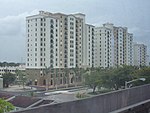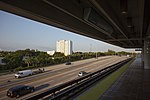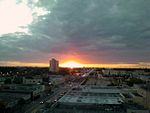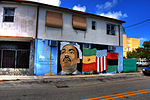Georgette's Tea Room House
1940 establishments in FloridaAfrican-American history of FloridaAfrican-American segregation in the United StatesAfrican-American tourist attractions in FloridaBoarding houses ... and 3 more
Buildings and structures in Miami-Dade County, FloridaHistory of Miami-Dade County, FloridaTourist attractions in Miami-Dade County, Florida
Georgette’s Tea Room House (also referred to as Georgette’s Tea House and Georgette’s Tea Room) is a former boarding house opened in 1940 by Georgette Scott Campbell. It catered to African American patrons during segregation in the American South. It would serve breakfast, lunch, tea and boarding to visitors and guests. It is located in the Brownsville section of the Miami metropolitan area of South Florida. The Tea Room received a historic designation in 1990. The Tea room is one of the properties owned by Bethany Seventh-day Adventist Church in Miami and is undergoing attempts of renovations by the Georgette Tea Room House organization.
Excerpt from the Wikipedia article Georgette's Tea Room House (License: CC BY-SA 3.0, Authors).Georgette's Tea Room House
Northwest 51st Street,
Geographical coordinates (GPS) Address Nearby Places Show on map
Geographical coordinates (GPS)
| Latitude | Longitude |
|---|---|
| N 25.8207 ° | E -80.2394 ° |
Address
Northwest 51st Street 2540
33142
Florida, United States
Open on Google Maps





